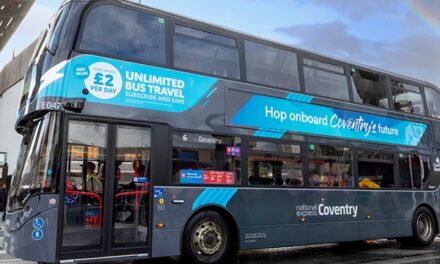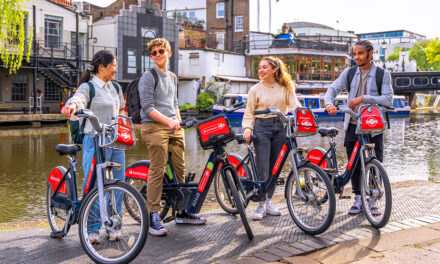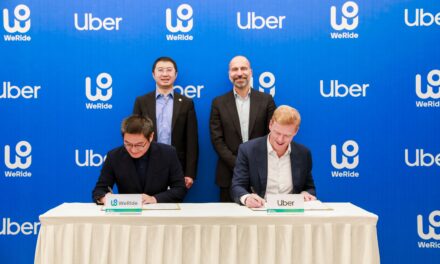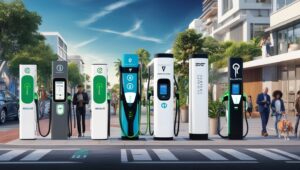In a letter to EU lawmakers signed by 41 hauliers, shippers, and logistics and e-mobility companies [1], including Maersk and DFDS, they say more ambitious CO2 standards in 2030 and 2040 will lower the costs and accelerate the production of zero-emission trucks at scale.
Truckmakers have ambitious voluntary commitments to sell more zero-emission trucks, which include electric and hydrogen vehicles. Therefore the companies are urging Members of the European Parliament and EU governments to increase the 2030 CO2 target from the currently proposed -45% to a -65% cut in emissions, to make sure that regulatory ambitions are brought at least on par with voluntary ambition levels. This would increase the number of green trucks on Europe’s roads in 2030 by more than 150,000 compared to the European Commission’s proposal, they say.
Archana Jagannathan, Chief Sustainability Officer at PepsiCo Europe, said: “PepsiCo’s ambition to reduce emissions by at least 40% by 2030 and to become net-zero by 2040 largely depends on the decarbonisation efforts of our value chain partners, which includes third party logistics. Therefore, the transition towards an affordable and emission-free movement of goods in Europe is our shared responsibility. We urge policymakers in Brussels to set more ambitious CO2 standards for trucks as it is not only a critical step towards achieving the EU’s climate neutrality goals but also a strategic move for the success of our industry.”
The signatory companies urge the EU to set a clear date for 100% of new trucks to be zero emissions. This is crucial to decarbonise the sector by 2050, considering the average lifetime of trucks is around 18 years in Europe. The letter says all truck types should be subject to climate targets to ensure manufacturers ramp up zero-emission vehicle production across all segments. The Commission’s proposal exempted some vehicle types including garbage and construction trucks and some urban delivery trucks, which are often easy to electrify – with benefits for air quality in cities.
Kenny Kristensen, Global Head of Energy Transition Execution, Maersk Landside Transportation, said:“A.P. Moller-Maersk is fully committed to achieving net-zero greenhouse gas emissions by 2040 across all of our business. Doing so requires significant investments and we believe that committing to a 2035 end year for fossil-fuel powered vehicles purchases brings us closer to achieving our emission targets and thus helping our customers reduce their greenhouse gas footprint. But driving the energy transition of road freight cannot be done only by leading companies such as Maersk and many of our highly valued customers and logistics partners. More action is needed from regulators, business and consumers and we recommend all policies to set strong demand signals for the industry to accelerate the energy transition.”
Several companies have established more ambitious climate targets and emphasise the importance of a substantial increase in the availability and expedited delivery of a wider range of zero-emission trucks in the coming years. The economies of scale will reduce upfront purchase costs of electric and hydrogen trucks and ensure they soon become less expensive to own and run than diesel trucks.
Sophie-Kim Chapman, Head of Decarbonisation at DFDS, said: “It’s in all of our interests to push for more zero-emission trucks on the road, earlier, and for clear intentions regarding both trucks and infrastructure. This will get us faster to both emissions reductions and to cost parity with diesel, and it enables transport operators like us to plan ahead with more confidence.”
The signatory companies acknowledge the EU has put in place enabling conditions for the roll-out of zero-emission trucks, including mandatory charging points and road toll discounts for electric and hydrogen trucks. They urge Member States to implement these EU laws as soon as possible. Nonetheless they believe the revision of the truck CO2 standards gives EU policymakers the opportunity to decide whether Europe will reap the benefits of affordable emission-free movement of goods and all the additional benefits that will bring for the environment, industry, drivers and public health.
The EU Commission has proposed a 45% CO2 reduction target (compared to 2019/2020 levels) for new trucks sold in 2030, rising to a 90% reduction in 2040. EU environment ministers and the European Parliament are currently debating the draft standards and should agree on the final Regulation early next year.
The letter is signed by: A. P. Moller – Maersk A/S, APL logistics, Asstra Forwarding AG, Avere, Boekestijn Transport, Brightmerge, ChargePoint, Council for Sustainable Logistics (CNL), Colruyt, Contargo, Currys, Danfoss, DFDS, DPDHL, European Shippers Council, EV Box, Fixemer Logistics GmbH, Forto, Heineken, HMM Co Ltd, Integre Trans, Knauf Insulation, Kuehne and Nagel, Meyer & Meyer, Nestlé, Nike, Oatly Group, PepsiCo, Polish Chamber of E-mobility Development (PIRE), REE Automotive USA Inc., Samskip Multimodal, Schachinger Logistik, SEA Electric, Stolt Tank Containers BV, University Gustave Eiffel, VAI Capital, van der Wal, Vattenfall, Volta Trucks, Zeus Labs, Zilch Forwarding (formerly Scope3 pty/EmissionsIQ).
Letter:
Haulier, logistics, shipper and transporter companies call on EU policymakers to urgently increase the supply of zero-emission trucks by setting more ambitious truck CO2 standards
Comments from other signatories:
Asstra Associated Traffic AG said: “As AsstrA Associated Traffic AG we have signed the heavy duty vehicles CO2 industry letter in order to boost demand on electric trucks’ services, to speed up the roll-out and make technology cheaper. We are interested in electric mobility as we believe that the future of first and last mile carriages will be electric. In this regard we would like to provide our clients with such solutions on a greater scale and at the best possible price. We hope that by means of boosted demand and mutual cooperation we could transit to our sustainable future faster.”
Giano Koskamp, QA & Sustainability Manager at Boekestijn Transport, said: “We are in the middle of one of the most impactful transformations in the transport sector. During this transition, we see a lot of willingness and commitment across the industry to decarbonise. Now we have the opportunity to capitalise on this momentum through ambitious, binding and clear legislation. It’s time to speed up in order to achieve the goals.”
Pieter Leonard, Capability manager transport, Colruyt Group, said:“With Colruyt Group, we certainly support this kind of initiative. We ourselves, as a pioneer, are already investing in BEV and FCEV vehicles so that our transport is fully zero emission by 2035. We therefore expect a regulatory framework to ensure that the supply of zero-emission vehicles in our sector increases.”
Kristin Kahl, ECTA spokesperson and Leader Sustainable Solutions Management at Contargo said: “We are in the process of expanding our e-truck fleet to 33 vehicles this year and have already participated in a second call for funding and applied for 59 more e-trucks. We at Contargo are committed to speed up the decarbonisation of our road freight transport operations. To obtain these vehicles, it is urgently necessary to scale up production as quickly as possible. Politics is required here.”
Jens Pejril, Managing Director at Fixemer Logistics GmbH, said: “Making sure that we can provide zero-emission transport services to our customers is part of the engagement of Fixemer Logistics GmbH.”
Pia Schwanenberg, Senior Sustainability Manager at Forto, said: “Forto supports the open call to the European Commission to set ambitious targets that enable zero-emission freight trucking – not only because this is what cargo owners are asking for but also because this is the right thing to do with logistics being responsible for 8% of global greenhouse gas emissions. Only by doing so can we achieve the goals we have set ourselves in the Paris Agreement to limit the global temperature increase to 1.5°C above pre-industrial levels.”
Loreta Dainytė, Head of Sustainability and Quality Department at Integre Trans, said: “At Integre Trans we firmly believe in taking decisive action to combat climate change and reduce emissions in the trucking industry. We are committed to a sustainable future and advocate for comprehensive measures that encompass all truck types, drive zero-emission vehicle production, and transition towards a fleet of zero-emission trucks. We are dedicated to creating a greener and more environmentally friendly trucking industry.”
Julian Fassin, Central Supply Chain PMO at Knauf Insulation, said: “At Knauf Insulation, we are working for a better world, with sustainability at the heart of what we do. Our products are made to minimise the climate impact, by improving the insulation of buildings. Nevertheless, we are losing credibility if we cannot supply our products in a ‘green manner’. Today, the lack of ambitious EU targets in terms of zero-emission trucks partially prevents us from accelerating this transition. This is the reason why this is crucial for us to review the policy, by increasing the requirements to the level of our ambitions.”
Marcin Nowak, Board member at the Polish Chamber of E-mobility Development (PIRE), said: “The Polish Chamber of E-mobility Development (PIRE) supports the letter of the European Clean Trucking Alliance (ECTA) community to increase ambition for zero-emission heavy-duty vehicles. The decarbonisation of heavy transport is a crucial element in achieving climate neutrality, so the targets set should be ambitious enough to create and stimulate the market for zero-emission transport. The proposals put forward by the European Clean Trucking Alliance community are in line with market trends and respond to the declarations of vehicle manufacturers. In our opinion, it is also crucial to set a clear date by which 100% of new trucks will be zero emission. The Polish Chamber of E-mobility Development declares its full support for the postulates of the European Clean Trucking Alliance community.”
Max Schachinger, Chairman Council for Sustainable Logistics (CNL) and Chairman of the Advisory Board at Schachinger Logistik Holding GmbH, said: “Providing quality, sustainable, and affordable transport solutions for our clients is key. We therefore encourage policy makers to agree on ambitious CO2 standards for trucks to support the logistic sector to move quicker to zero-emission transport solutions.”
Dr Laetitia de Blanc, Chair Logistics City, University Gustave Eiffel, said: “Freight decarbonisation is finally getting the attention it deserves, and multinational companies are at the forefront of finding solutions to reach radically more sustainable supply chains.”
Henk van der Wal, CEO at Van der Wal, said: “Investing in zero-emission trucks should be seen as an investment in the (living) conditions of future generations and not as a cost in today’s operations.”
Dr Christopher de Saxe, Head of Sustainability at Zeus®, said: “While Zeus welcomes the EU’s revised decarbonisation targets for heavy-duty vehicles, we believe that these need to be more ambitious. Evidence suggests that the proposed 45% reduction by 2030 will not get us onto the trajectory needed to achieve net zero in time. If we miss this early on, the challenge stands to become insurmountable later. Furthermore, the legislation aims to encourage the scale-up of zero-emission HDV production to drive their costs down and accelerate their uptake. For this to be truly effective, the legislation should apply to all vehicle categories, regardless of their relative contribution to total emissions.”













